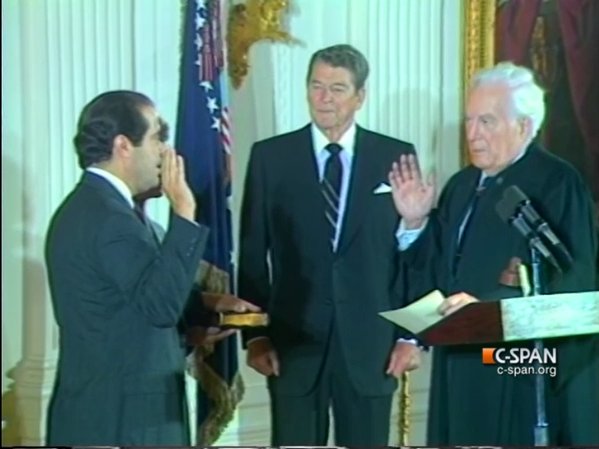Equally famous for his persuasive and forceful onslaught of questioning as for his legendarily colorful prose, the late Supreme Court Justice Antonin Scalia left in his wake the shoes of an intellectual giant. Scalia was found dead in his room at a luxury ranch resort in Texas on February 13, having passed of natural causes. At 79 years old, he had served in the Highest Court of the Land for two decades. During this time he established himself as a tenacious and humorous Justice prone to make the courtroom erupt into laughter and publish dissenting opinions describing court rulings as “jiggery-pokery.”
The son of Italian immigrants in Queens, New York, Scalia always excelled in academics and was valedictorian three times in his life, all the way from high school to Georgetown University and later Harvard Law School. His deep appreciation for the educational aspect of law persisted throughout his career and led him to abandon his success as a commercial law attorney to take up teaching positions at the University of Virginia and later at the University of Chicago Law School. However, it was not long before he was appointed to government positions, first by President Nixon to the General Counsel for the Office of Telecommunications and later as the Assistant Attorney General in the Office of Legal Counsel. After dealing with the aftermath of the Watergate scandal, he returned to academia, but soon was appointed to the Court of Appeals by President Reagan and ultimately the Supreme Court in 1986.
Though the Senate approved the nomination unanimously with a vote of 98-0, his controversial political views and textbook example of the originalist approach towards constitutional interpretation gave him a reputation within and without the courtroom that was often divisive. As one of the most conservative Justices, his philosophy towards the law stemmed from the belief that the Constitution should be interpreted using the intentions and meanings that were in place at the time it was written. He rejected the popular idea of the Constitution as a living document meant to change with the needs of modern society.
This philosophy became his justification for many of the unpopular stances he upheld in the most controversial cases. Scalia did not believe there was a constitutional right for women seeking abortions, nor did he believe the death penalty was cruel and unusual punishment. He was a strong supporter of an individual’s right to carry weapons. Most recently, he did not believe the Supreme Court had a place making a decision about same-sex marriage, and published a dissenting opinion stating that the ruling was at odds with the principles upon which the nation was built.
Scalia published more dissenting opinions than any other Justice. His talent for rhetoric remains renowned and filled with personality and lyricism, no matter how critical. He was a polarizing figure and ultimately became regarded as the anchor of the conservative Justices, which made him one of the most influential voices in the world of law. His attitude towards his work was often combative and competitive, earning him a reputation of being one of the meanest Justices. However, his coworkers were outwardly fond of him – especially Justice Ruth Bader Ginsburg, his long time friend and vacation partner. Those who knew him personally were quick to speak of him as a clever and charming Renaissance man with passions in opera, hunting and theater arts.
Scalia left in his wake a huge political storm surrounding the matter of his replacement. The epic battle between liberals and conservatives has extended to the courts as the balance of the two ideologies hangs on the line. The future of the Supreme Court, whether it be tipped towards a conservative or a liberal majority is the core of the controversy. This conflict is directly represented by President Obama, a liberal, wanting to fill the vacancy in the Court and the conservative-controlled Senate claiming to refuse any appointment he makes. Since the appointing of Supreme Court Justices is one of the ways a President can leave his legacy in the government, Obama has done his best to earn bipartisan support by suggesting candidates that would be hard for the conservative party to turn down. However, the upcoming presidential election has antagonized the entire ordeal and made the topic red-hot in every political realm. In classic Scalia fashion, he left the country with fists held up, ready to defend its beliefs with the passion and vigor he expressed.
Though controversial and often infamous, Scalia will go down in history as one of the most influential and well-respected geniuses in law. His beautiful writing and fervent interrogation tactics remain, as do his many fond friends and family. Whether one agrees with his views or not, there is no denying a legend has passed away this year. Justice Scalia will be missed.



































